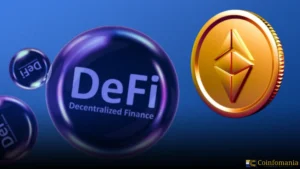Will the GENIUS Act Threaten DeFi and Stablecoin Yields?

The GENIUS Act: A Catalyst for Growth in DeFi and the Crypto Landscape
The recently enacted GENIUS Act is set to reshape the financial landscape by enhancing global access to the US dollar through stablecoins. However, some of its stipulations, particularly the prohibition on stablecoin issuers providing interest to holders, may inadvertently foster growth in other sectors of the cryptocurrency market.
Will the GENIUS Act Shift Investment Towards DeFi?
With the GENIUS Act officially in place, the stablecoin market is witnessing rapid expansion on a global scale. The US government’s endorsement of these digital assets, backed by a robust regulatory framework, is expected to drive widespread adoption.
Interestingly, the Act’s restrictions, especially the ban on yield-bearing stablecoins, could lead to increased activity in alternative areas of the crypto ecosystem. While stablecoin issuers may hold interest-earning reserves like Treasury bills, they are unable to pass this income onto their holders.
This situation poses a challenge for institutions and sophisticated investors, who are often bound by fiduciary responsibilities to seek returns on their investments. As regulated stablecoins cannot offer passive income, significant pools of institutional capital may be redirected towards alternative yield-generating opportunities.
Rerouting the Quest for Yield
For many of the leading stablecoin providers, the GENIUS Act’s restriction on interest payments is not a significant change. Major players like USDT and USDC have historically not offered direct yields to their holders, meaning the new legislation does not alter their existing business models.
However, this law does create barriers for new entrants, thereby protecting established offerings and indirectly encouraging investors to explore yield opportunities elsewhere. This shift could lead to a surge in interest towards decentralized finance (DeFi) platforms, which offer more transparent and potentially lucrative options, such as lending protocols and liquidity pools.
The market is already reflecting this trend, with investors increasingly favoring DeFi versions of stablecoins, such as Aave’s aUSDT and Ethena’s sUSDe. These alternatives allow users to stake or lend stablecoins within decentralized frameworks, generating returns.
Additionally, tokenized money market funds (MMFs) from firms like BlackRock and Franklin Templeton are emerging as significant channels for stablecoin yields. Recent data indicates that the combined market capitalization of these staked stablecoins and tokenized MMFs has surpassed $10 billion.
Rather than diminishing the demand for yield on stable assets, the GENIUS Act redirects it towards other financial products, highlighting the growing importance of yield-generating opportunities for institutional investors.
DeFi‘s Appeal to Institutional Investors
As institutional players seek yield in the evolving landscape shaped by the GENIUS Act, DeFi platforms present compelling advantages that align with their investment strategies. These platforms offer programmable yield, global liquidity, and access to innovative financial instruments, all supported by transparent smart contracts.
With the GENIUS Act paving the way for clearer regulations, institutions are increasingly drawn to the yield potential of DeFi, especially when combined with effective risk management tools and compliant custody solutions.
This interest is particularly focused on what experts refer to as “real yield” opportunities, which generate revenue from genuine economic activities rather than relying on token incentives. Key areas for these revenue streams include trading fees from decentralized exchanges and interest from overcollateralized lending platforms.
Will Traditional Finance Compete with DeFi?
Despite the GENIUS Act’s limitations on stablecoin issuers, it does not preclude stablecoin holders from earning returns. Other entities, including banks and broker-dealers, can still offer yield opportunities, potentially expanding the market for stablecoins rather than constraining it.
Some experts believe that traditional financial institutions will create regulated platforms to compete with existing DeFi lending protocols, thereby capturing market share from decentralized options.
However, the indirect benefits of the GENIUS Act may provide the most significant advantages for DeFi and the broader cryptocurrency ecosystem.
Banks as On-Ramps: A New Era of Adoption
In the wake of the GENIUS Act, DeFi adoption is expected to flourish, not solely due to yield-seeking investors but also because of a potential influx of new users. Major US retail banks, such as JPMorgan Chase and Citibank, are likely to issue stablecoins and incentivize their customers to utilize them. The vast number of retail bank account holders in the US presents a tremendous opportunity for crypto adoption.
Moreover, the active participation of major financial institutions in the crypto market as stablecoin issuers could lead to a significant political shift. Their vested interest in promoting and expanding these markets would make it challenging for future administrations to revert to a hostile stance towards cryptocurrency.
A Certainty of Growth
While opinions vary on the specific mechanisms of growth, there is a consensus among experts that the GENIUS Act will significantly expand the cryptocurrency ecosystem. Whether through increased institutional engagement with real yield opportunities, the development of new connections between traditional finance and DeFi, or a substantial influx of new users via bank-issued stablecoins, the future of DeFi appears promising and poised for considerable growth.







